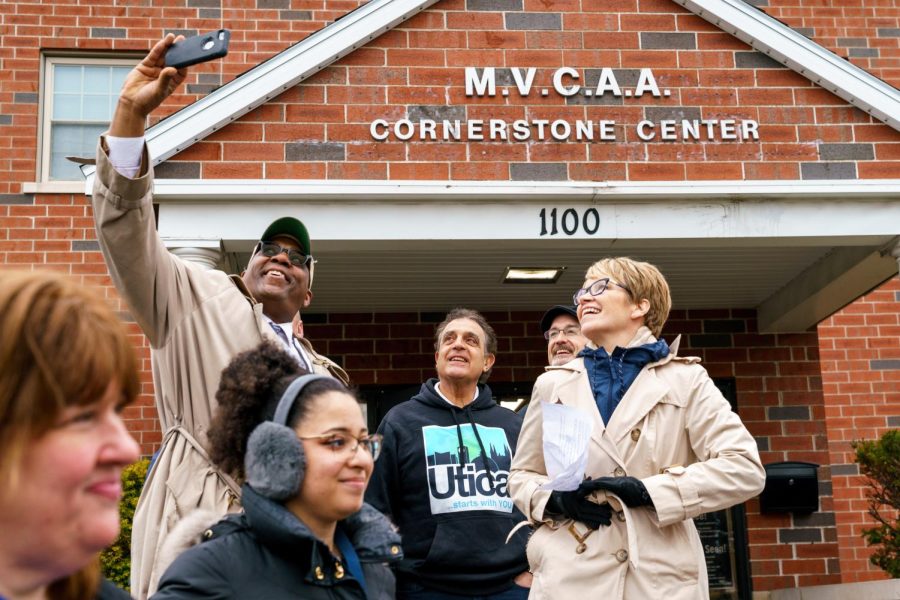President Casamento Guest Column: Forget the rumors – liberal arts are here to stay
President Laura Casamento and company at the 2021 Unity Walk
January 30, 2023
Forget the rumors – liberal arts are here to stay
Popular rumor has it that Utica University is abandoning the liberal arts.
This narrative has been circulating on social media since the announcement of my recommendations to the University’s Board of Trustees that we cease admitting new students to a list of under-enrolled majors that includes philosophy, sociology and anthropology, chemistry, geoscience, international studies, and Spanish, as well as selections in the health professions, business, and justice studies.
The recommendation to eventually discontinue or “sunset” these majors is the result of an academic portfolio review process that is common practice at colleges and universities across the country. It is a data-informed process that enables institutions like ours to better match our major offerings to the needs and demands of the students we serve.
Does this mean, as some have suggested, that we are demolishing the strong foundation of learning in the arts and sciences that has animated and sustained Utica University since its earliest days?
The answer is an unequivocal no. Nothing could be further from the truth, and here’s why.
Let me be clear – these traditional liberal arts disciplines have always been and will always remain fundamental to student learning at Utica. Utica University is a career-focused institution firmly grounded in the liberal arts. Our recently updated General Education Program reflects the degree to which disciplines like philosophy, chemistry, sociology, and others play a central role in every student’s academic journey.
For instance, while we may no longer offer a major in philosophy, Utica University students will continue to study philosophy in pursuit of other majors and as an integral part of the university-wide curriculum on critical thinking and reasoning. They will also be able to choose from robust academic minors in the discipline, none of which are affected by this proposal.
In short, it is the majors listed in my recommendations that we have proposed sunsetting, not the disciplines they represent. The academic departments, minors, and many of the courses in these disciplines will remain in place, and faculty in these departments will continue to deliver the exceptional, highly personal learning experiences Utica has been known for since its founding.
It is important to stress that this decision will not in any way impact students currently enrolled or accepted into these majors. They will have the opportunity to complete their full course of study. Student learning in these majors will be fully supported and resourced as before, and our four-year graduation guarantee will remain in effect.
Why are we taking this step at this time? The principal reason is that students are no longer enrolling in these majors in significant numbers. This is true not only for Utica University but for institutions of higher learning throughout the nation.
Most students at Utica do not choose to major in liberal arts disciplines. Take philosophy, for example. We have awarded a total of two philosophy degrees in the past three years. But let’s set this aside for a moment. No one should dispute the value of philosophy to an integrated, holistic educational experience. I want every student to study philosophy, and to have the opportunity to take classes with our talented faculty. But that’s not to say we need to have a major in philosophy in order to justify its importance.
Now let’s come back to the data. Utica University currently offers 59 majors. The 15 total majors recommended to be sunset are the choice of only 4.4 percent of Utica’s current student body. In contrast, our five most highly enrolled majors – nursing, health sciences, cybersecurity, criminal justice, and construction management – account for nearly 60 percent of our students. Our 10 most highly enrolled majors, account for nearly 75 percent of our student body.
These figures reflect a national trend. According to the National Student Clearinghouse Research Center, there are four million fewer college students in the United States than 10 years ago. Programs in the liberal arts are suffering most severely from enrollment decline. Across the country, there has been a 25 percent decrease in the number of students majoring in the liberal arts and humanities since 2012. Enrollment in the liberal arts has fallen nearly 10 percent over the past two years alone, according to the Hechinger Report.
Utica University has a long history of responding to the workforce needs of the communities we serve as well as student demands for relevant, career-focused learning that prepares them for professional opportunities in established and emerging fields. That does not mean we are abandoning our commitment to learning in the arts and sciences. Quite the contrary. My recommended changes to our academic portfolio will open up new opportunities for interdisciplinary learning and innovation. It will enable us to better leverage the enormous talents and capabilities of our liberal arts faculty across the entire undergraduate population at Utica via initiatives like new themed pathway minors.
Despite the criticism, I am confident that this is the right path forward for Utica University. It is consistent with our values, mission, and history. I believe it will enable us to build on the remarkable success we have achieved in recent years, with initiatives that have produced a more than 30 percent rise in first-year applications, a 135 percent rise in transfer applications, and a more than twelve-fold increase in international applications in the current admissions cycle.
There are a lot of exciting things happening here at Utica, and despite the rumors, the liberal arts remain at the center of it all.
Dr. Laura Casamento is the President of Utica University.


















![President Todd Pfannestiel poses with Jeremy Thurston chairperson Board of Trustees [left] and former chairperson Robert Brvenik [right] after accepting the university's institutional charter.](https://uticatangerine.com/wp-content/uploads/2023/10/unnamed.jpeg)





















































































































Matthew Lee • Jan 31, 2023 at 5:45 am
I hope the board of trustees see the bigger impact this will have in the college then the president does. The problem is that yes there will still be classes on these fields at Utica University but if a future student decides that he/she wants to into one of these core principles and wants to go into a major about it (ex philosophy) then the student will have no reason to stay at UU and should transfer to a different college/University that does.
Utica University will continue to teach subjects that it will not have a degree for. Risking lossing students that discover a passion for those programs.